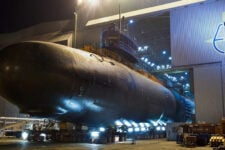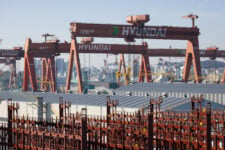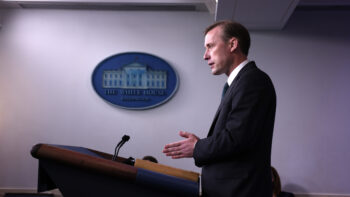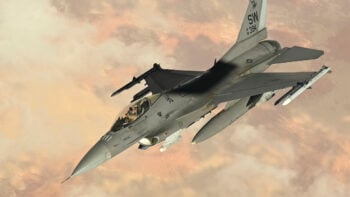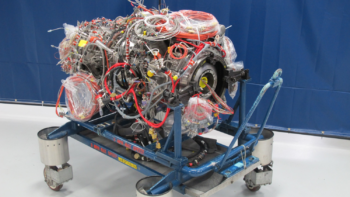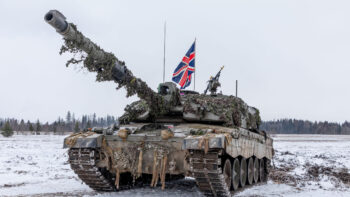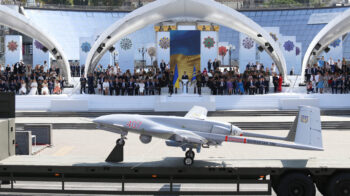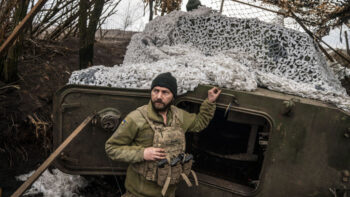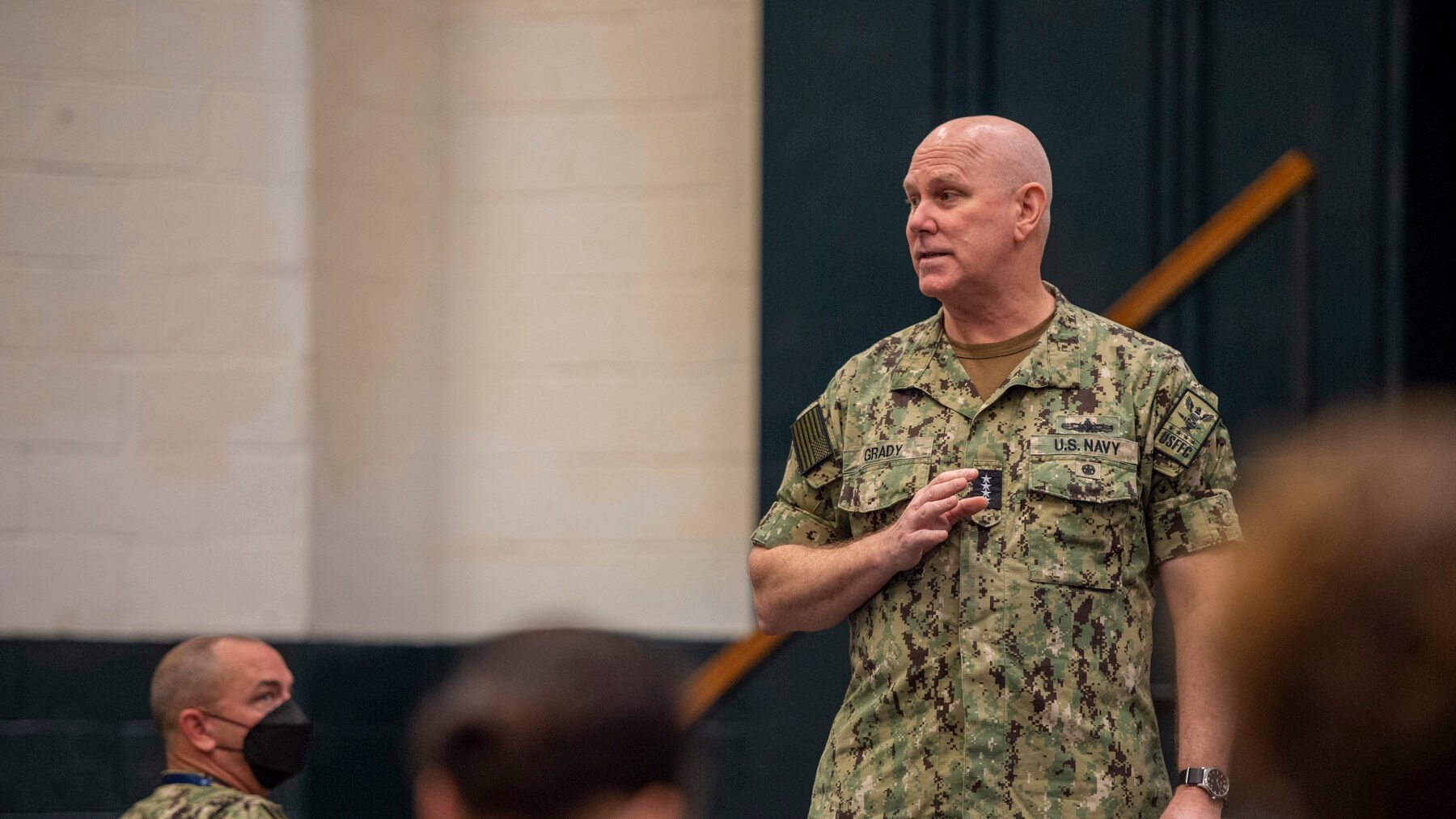
Adm. Christopher W. Grady, commander U.S. Fleet Forces Command, was nominated on Nov. 2, 2021, as vice chairman of the Joint Chiefs of Staff. (US Navy/Petty Officer 1st Class Theodore Green)
WASHINGTON: If Adm. Christopher Grady is confirmed as the next vice chairman of the Joint Chiefs of Staff, he will face a daunting challenge — ensuring the military is building the right systems to counter China at a time where constrained budgets mean that not every requirement can be funded.
But experts say his operational experience could bring a more grounded approach to acquisition and strategy than the pie-in-the-sky dreams of a desk-bound nominee.
“It will introduce into the vice chairmanship somebody who is coming directly from the fleet… [who] has that perspective of an operator faced with the challenges of dealing with day-to-day activities to counter adversaries and deter aggression,” said Bryan Clark, a fellow at the Hudson Institute who worked with Grady on former Chief of Naval Operations Adm. Gary Roughhead’s staff. “He’s not a creature of the Pentagon.”
The White House on Tuesday announced the nomination of Grady, who currently serves as head of Fleet Forces Command, to replace Air Force Gen. John Hyten as the military’s No. 2 officer.
The vice chairman leads one of the Pentagon’s most important acquisition organizations, the Joint Requirements Oversight Council (JROC), which adjudicates the services’ requirements for major weapon systems, ensuring that they meet operator needs and that development takes cost and schedule into account.
That job could be made even more difficult and complicated with a technologically advanced foe like China on the rise and competing priorities from among the military branches and combatant commands.
“The requirements are many, and the dollars are not infinite,” said Mark Vandroff, a former senior director for defense policy on the Trump administration’s National Security Council and current chief executive of Fincantieri Marinette Marine. “There’s what you want to do, and then there’s what you can afford to do, and those are not always the same thing.”
Clark said the most notable aspect of Grady’s selection is that most of his experience stems from operational deployments, not administrative positions.
A surface warfare officer, Grady has previously served as commander of US 6th Fleet and the commander of Naval Striking and Support Forces NATO. He served in combat supporting the wars in Iraq and Afghanistan as commander of Destroyer Squadron 22 and the Carl Vinson Carrier Strike Group, amongst other posts.
The few administrative posts he has held include tours on the Joint Staff, the Navy’s legislative affairs office and as deputy executive secretary of the National Security Council.
Grady’s experience as head of Fleet Forces Command will also be “extremely valuable,” Vandroff said.
“Fleet Forces Command kind of plays that requirements integration role for the Navy that the JROC plays in the joint world,” Vandroff said. “He’ll have good insight on that, given his background, and so that’s another plus for him going into the job.”
The Question Of Transforming The JROC
Hyten made reforming the JROC a major priority of his two-year term in office, issuing a series of directives on Joint All Domain Command and Control (JADC2), joint fires, contested logistics and information dominance, with a final directive on integrated air and missile defense currently undergoing the approval process.
As a result of new legislation that extended the term of the chairman and vice chairman, Grady will have four years to influence the JROC, although it remains to be seen whether he will adopt Hyten’s approach or will carve out a new direction for the council.
Clark pointed out that the vice chairmanship has traditionally been focused on long-term acquisition and capability goals. Hyten complained about that paradigm, positing that the JROC needed to be more fixated on near-term capability gaps.
As an operator, Grady could be uniquely situated to provide that perspective to the acquisition community, Clark said.
“I think it’d be really good to have somebody coming from the operating forces that knows pretty much what the capability gaps are, what are we facing today, [and] what is it that these forces need to have in order to operate and counter Chinese and Russian forces,” he said. “It’ll be an interesting new take that will probably reshape the JROC even more — basically continue what Hyten has been trying to do.”
If confirmed, Grady will be met at the Pentagon by Vice Adm. Ronald Boxall, the Joint Staff’s director of force structure, resources and assessment. That role is the “key staff officer for the vice chairman” with regards to the requirements process, Vandroff said.
Boxall is known to be “extremely capable, and extremely knowledgeable in this area,” Vandroff said. “And I believe that he and Adm. Grady have a strong relationship. So, he’ll be well assisted.”
Lawmaker Bemoans A ‘Virtually Guaranteed’ Vacancy
Grady’s nomination on Tuesday followed weeks of media speculation and concerns from lawmakers who worried that the Biden administration was cutting it too close to Hyten’s planned Nov. 21 retirement date.
Senate Armed Services Committee Ranking Member Jim Inhofe, R-Okla., told Breaking Defense today the administration’s delay in naming a nominee has “virtually [guaranteed] a vacancy in the position.”
“We are facing existential threats from China and Russia as they rapidly invest in and modernize their military — not to mention the resurging threat from terrorist organizations in the Middle East and ongoing provocations from Iran and North Korea,” said Inhofe. “The president needs a full bench of military advisors to guide him. Fortunately, Admiral Grady seems to understand the challenges we face.”
To be confirmed as vice chairman, Grady must meet with members of the Senate Armed Services Committee, provide written responses to policy questions, testify in front of the committee, and be approved for the job in votes among the SASC and — finally — the full Senate.
Complicating the confirmation timeline further are the ongoing negotiations between Capitol Hill and the White House over anticipated infrastructure legislation. Those talks have already disrupted the schedule to pass the annual defense policy bill, a delay both Democrats and Republicans have begun criticizing.
“I do think this is an unforced error on the part of [Senate Majority Leader Chuck] Schumer,” said House Armed Services Committee Chairman Adam Smith, D-Wash., POLITICO reported. “He’s the guy who’s decided not to bring it up.”
